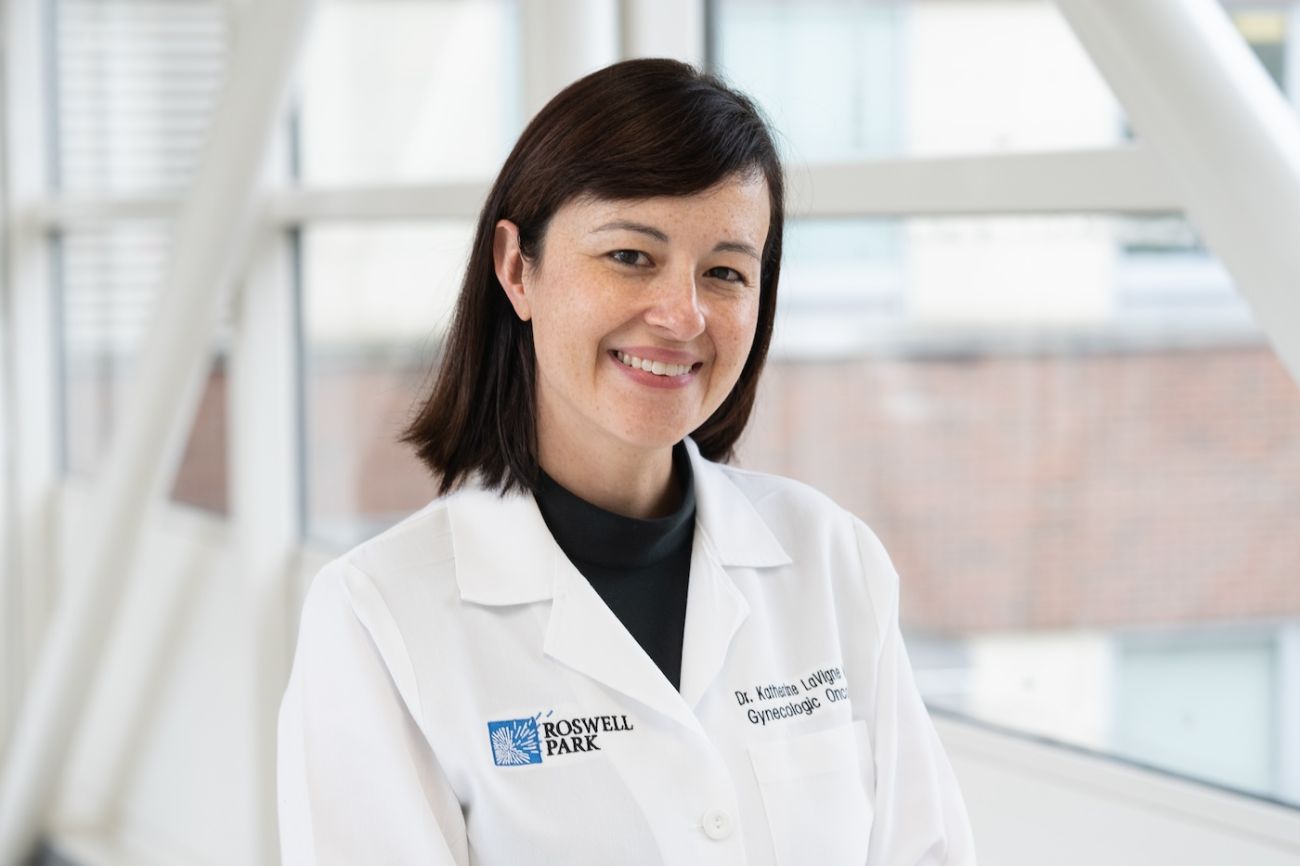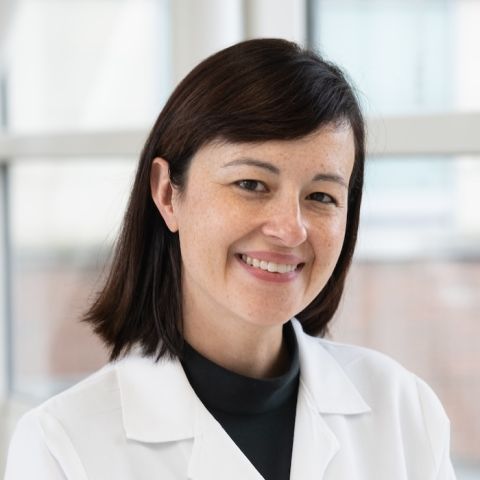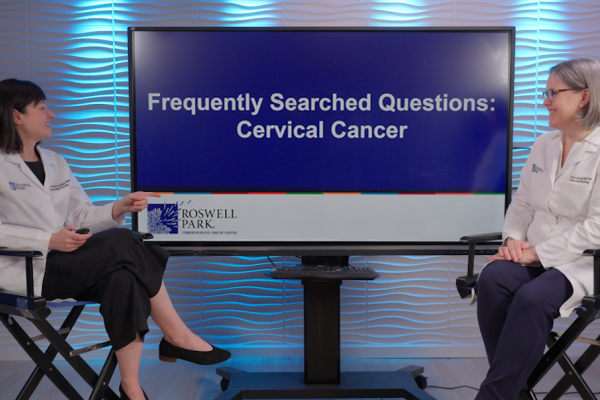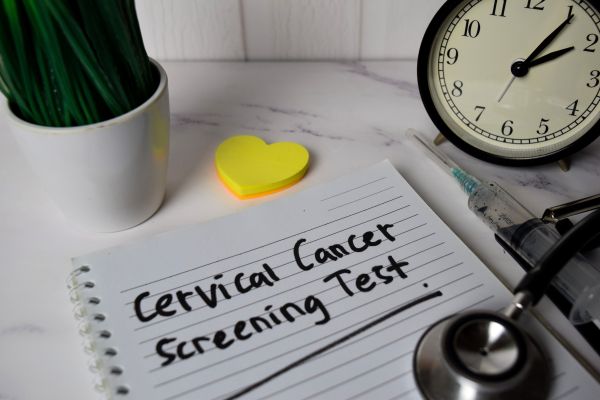What to learn about their experience, fertility-sparing options and more — before deciding where to seek cancer care.
After receiving a diagnosis of cervical cancer, you’re bound to have a lot of questions. What will my treatment entail? Will I need surgery?
Receiving any kind of cancer diagnosis is scary and stressful, but the most important thing to do is make sure you’re getting the best care possible. Because surgery is part of the treatment plan for many women, Katherine LaVigne Mager, MD, FACOG, a gynecologic oncologist at Roswell Park Comprehensive Cancer Center, has some advice on what to ask a surgeon before deciding where to undergo treatment.
How frequently do you perform cervical cancer surgeries?
Cervical cancer is a rare cancer type in the United States and it is important you get your care at a center that specializes in the treatment of this disease. Roswell Park is a Comprehensive Cancer Center with a Gynecologic Oncology team that has experience in treating cervical cancer at all stages of the disease and all modalities of treatment. Roswell Park is rated as a High Performing Hospital for Gynecological Cancer Surgery by U.S. News & World Report, indicating our doctors’ expertise in performing a high volume of surgeries and for the positive patient outcomes after receiving their care here.
“As a gynecologic oncologist, I perform hundreds of surgical procedures each year for the treatment of cancer, including surgical management of cervical cancer,” Dr. Mager says. That kind of experience translates into better outcomes and results for patients, in terms of their surgery and their quality of life.
Do you provide fertility-sparing surgery?
Cervical cancer is most commonly diagnosed in women between the ages of 35 and 44, meaning some patients might want to explore fertility-sparing or preserving options as part of their treatment.
Roswell Park offers consultations for fertility-sparing procedures. “There are fertility-sparing options that involve surgery that removes only a portion of the cervix or removes the entire cervix but leaves the remainder of the uterus in place that can allow for future pregnancy if the patient desires,” Dr. Mager says.
“Given that cervical cancer is often diagnosed at an early stage and is highly curable at an early stage, these are women who are going to live, whose life expectancy is not going to be impacted by this cancer,” she adds. “It’s important that we make sure our treatment is not going to impact their life in other ways — premature menopause is one of them. There are times we can preserve a woman’s ovaries in order to preserve ovarian function, and there’s other times when we can talk about doing hormonal replacements so we can mitigate some of those effects.”
Roswell Park’s Young Adult Program connects patients with service providers and counselors to help them make important decisions about their future childbearing options.
You have time for a second opinion
A second opinion is the best way to ensure that your initial diagnosis is accurate and that the recommended treatment strategy is right for you.
Should I have other treatments before surgery?
“Surgical treatment is based on the stage of cancer and the characteristics of the tumor,” Dr. Mager explains. “For some women, surgery will be the first step; for some women, a combination of chemotherapy and radiation will be the first step. For others, going straight to chemotherapy might be the first course of treatment. Each person’s treatment regimen is tailored to their particular situation.”
The sequencing of these treatments is just as important as what they entail. That’s why you need a comprehensive evaluation and treatment plan from the start.
Should I consider a clinical trial?
“Clinical trials are something that can benefit you at any point in your treatment course, from early-stage disease to recurrent disease, and it just allows you to get access to innovative and cutting-edge treatments that we otherwise couldn’t access for a couple of years.
“Roswell Park, being a comprehensive cancer center, has a robust clinical trial portfolio,” something that wouldn’t be available at other hospitals in the area. “Going on a clinical trial allows patients to have access to treatments that they wouldn’t otherwise be able to see, still in the testing process,” Dr. Mager says. “Often there’s a thought that clinical trials are something you go on as a last resort, but that’s not actually the case at all. It provides an incredible opportunity at all points in the treatment process.”
Why should I go to Roswell Park for my treatment?
“Cervical cancer is a highly curable disease at early stages, but you want to make sure you get the right treatment first, because you have one opportunity to have really good treatment from the start,” Dr. Mager says. “The guidelines around cervical cancer are constantly evolving. Best practices are constantly evolving. Making sure you get the right diagnosis, the right staging and the right treatment plan in place, tailored to you; that is hugely important for how you’ll do long-term. As a comprehensive cancer center that sees a higher volume of cervical cancer and is up to date on the most recent advances, this is where you’re going to get the best care.”
Additionally, at Roswell Park, all test results and tissue samples are reviewed by pathologists who have a specialty in gynecologic cancers, allowing for a more accurate diagnosis and disease staging.
“Getting the diagnosis right is really the foundation for a good treatment plan and it’s important to have the pathology reviewed at a center that has a specialty in gynecologic cancers,” Dr. Mager says. “Here at Roswell Park, we have pathologists who specialize specifically in gynecologic cancers and reviewing slides from GYN cancers.” That means a better and more precise diagnosis for patients, leading to a personally tailored course of treatment to best address their specific cancer.




